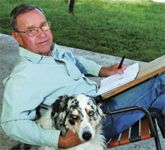Mind Over Miller: Fatherly advice
After I graduated from veterinary school in 1956, I drove down to Arizona from Fort Collins, Colo., to begin my practice career. My father said he wanted to give me some advice.
After I graduated from veterinary school in 1956, I drove down to Arizona from Fort Collins, Colo., to begin my practice career. My father said he wanted to give me some advice. He said that I had never paid income tax because my life thus far had been spent as a student, a soldier, an underpaid summertime ranch hand, and an afterschool dishwasher, a gardener, delivery boy, kennel attendant, ditch digger, cotton picker, golf caddy, racetrack serf, fruit picker, fence builder, and janitor. Consequently, I never earned enough money to need to pay income tax. The GI bill and cartooning paid for my veterinary education.

Robert M. Miller, DVM
Now that I would be paying income tax, my dad had two pieces of advice.
1. Don't cheat. It's not just a question of legality or morality. It's for your peace of mind. Cheating on your taxes isn't worth the anxiety over an audit.
2. Don't complain. He said that he hoped I would have the highest income tax in town.
Consequently, I have never cheated on my taxes, and I have never complained. I wince sometimes, but that is not audible.
Before the Silicon Valley economic crash a few years ago, my son shocked me by telling me that he thought he'd be able to retire by the time he was 40. He thought after that he'd move his young family to a small town and contribute his skills to the Nature Conservancy.
Mark started college as a biology major at California Polytechnic State University in San Luis Obispo. Undecided, he was considering veterinary medicine, human medicine, microbiology, and genetic engineering. In his third year, he took an elective course in marketing, which inspired him to acquire an MBA in that field and eventually enter the biotechnology industry.
His announcement that he thought he could retire by the age of 40 was startling to a hard-working veterinarian. We may be the most content of all the learned professions, but we are also underpaid.
So, I asked how he could possibly retire that young. He explained that his corporation had given him stock options that would, if the economy didn't change, provide him with the status of a millionaire by age 40.
I wrote to him a few weeks later and gave him this advice: When you have worked hard for your money and then you lose it, that's tragic. But when you have acquired wealth without working for it—like stock options, gambling, or an inheritance—and you lose that money, do not grieve. Shrug it off. It would be nice to have it, but if it's gone, so be it.
I told him that I was impressed and that his goal to move his young family to a small town and to serve a fine environmental organization was admirable.
Then the crash came, and with it, my son's plan collapsed. Although he was one of the minority of survivors in his company, he went ahead with his plans to move to a smaller community in California's Sierra Nevada Mountains. However, he had to continue working, and the Nature Conservancy has had to survive without his expertise.
Despite the disappointment, he seemed so upbeat and content that I finally had to comment on it: "You seem to be taking your disappointment very well since you lost those stock options. I'm impressed."
He responded, "Well, Dad, I remembered your advice."
Robert M. Miller, DVM, is an author and a cartoonist, speaker, and Veterinary Medicine Practitioner Advisory Board member from Thousand Oaks, Calif. His thoughts in "Mind Over Miller" are drawn from 32 years as a mixed-animal practitioner. Visit his Web site at www.robertmmiller.com.